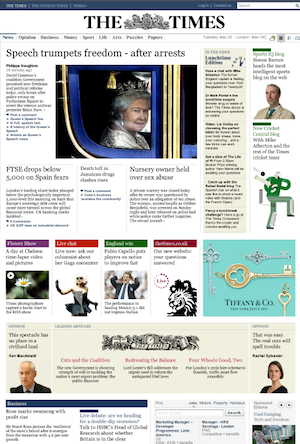This article is more than 1 year old
Murdoch's paywall: The end of the suicide era?
Staggering on could count as success
News International is offering a glimpse of its revamped Times and Sunday Times newspaper sites, before they disappear behind a paywall in four weeks' time. Murdoch's move has been greeted with a lot of angst from people who never pay for anything - the Kumbaya crowd - but also criticism from rivals who, hypocritically, secretly hope he'll succeed.
Then there's people for whom the word 'Murdoch' produces a Pavlovian response - he's the pantomime villain hate-figure Guardian readers use to frighten their children if they're naughty. Or maybe children evoke him to frighten their Guardian-reading parents. Still, the move is interesting for a bunch of reasons, and worth looking at dispassionately.
Defining 'success' here is problematic - and something nobody seems to be able to agree upon. We do know the parent group News Corporation lost $3.4bn in its last full financial year, so Murdoch's appetite for appeasing people who'd never pay him a penny is understandably wearing thin. While the daily Times has never made money, and has been used as a competitive battering ram, the Sunday Times is the cash cow that's now (apparently) making a loss. Something had to give.
The Times site design junks the camp pastel-shades and generous white space that were fashionable in 2006, when it was last revamped. It now looks a lot more like a professional newspaper than a blog, and if there's a criticism, it's that the design could look even more like a newspaper. Scroll down just once and you're into multimedia featureland - for some reason, the op-eds appear halfway down the page, and feel like the footer - before the sections news reappears.
(You need to view it in portrait mode, the default for the iPad, natch, to do it justice.)
The Daily Mail on the other hand, has no doubts about what you want. There are no multimedia features - slide shows, live chats, podcasts or video reports - just a relentless display of Mail news, with the thrills for provincials downplayed in favour of showbiz cellulite. It's quite a brilliant formula, and very successful: no paper cares less about cultivating a New Media Strategy. It just bungs it out at minimal cost.
The new-look Sunday Times, appropriately enough, looks much more like an upmarket magazine. Unfortunately it buries its historical strength for breaking news. Again, it feels as if it's optimized for portrait view, and works much better if you swivel your monitor 90 degrees.
In a move also likely to be welcomed, the new Times sites will not allow anonymous or even pseudonymous comments - you must use your real name. Or work a bit harder on your pseudonym. The editors justify this by pointing out that anonymous comments don't encourage a community, which is hard to argue with. But many of the best contributions on boards, lists and now forums have come from the ranks of the pseudonymous, so it's harsh.
The sites are also highly unfriendly to grazing readers. Google will be blocked, and incoming links merely point to the paywall. Most sites, such as the Wall Street Journal and Financial Times, offer a teaser, and a ladder up the paywall. This just seems plain daft. And surprisingly, there isn't a great deal of unique content. The new Times designs, obviously for a paysite, dispense with advertising altogether.
So much for the smart resdesign. But will it work financially?

